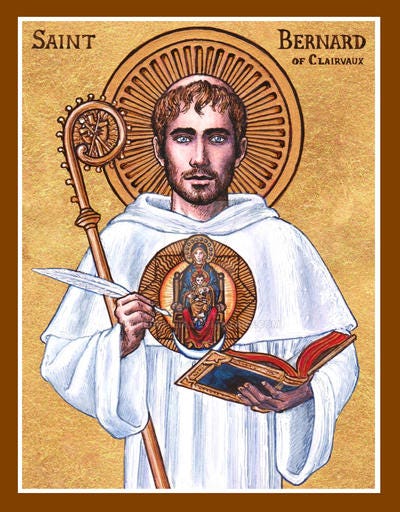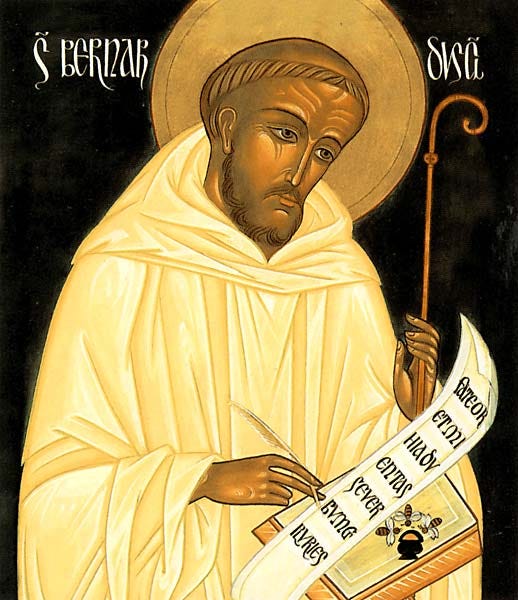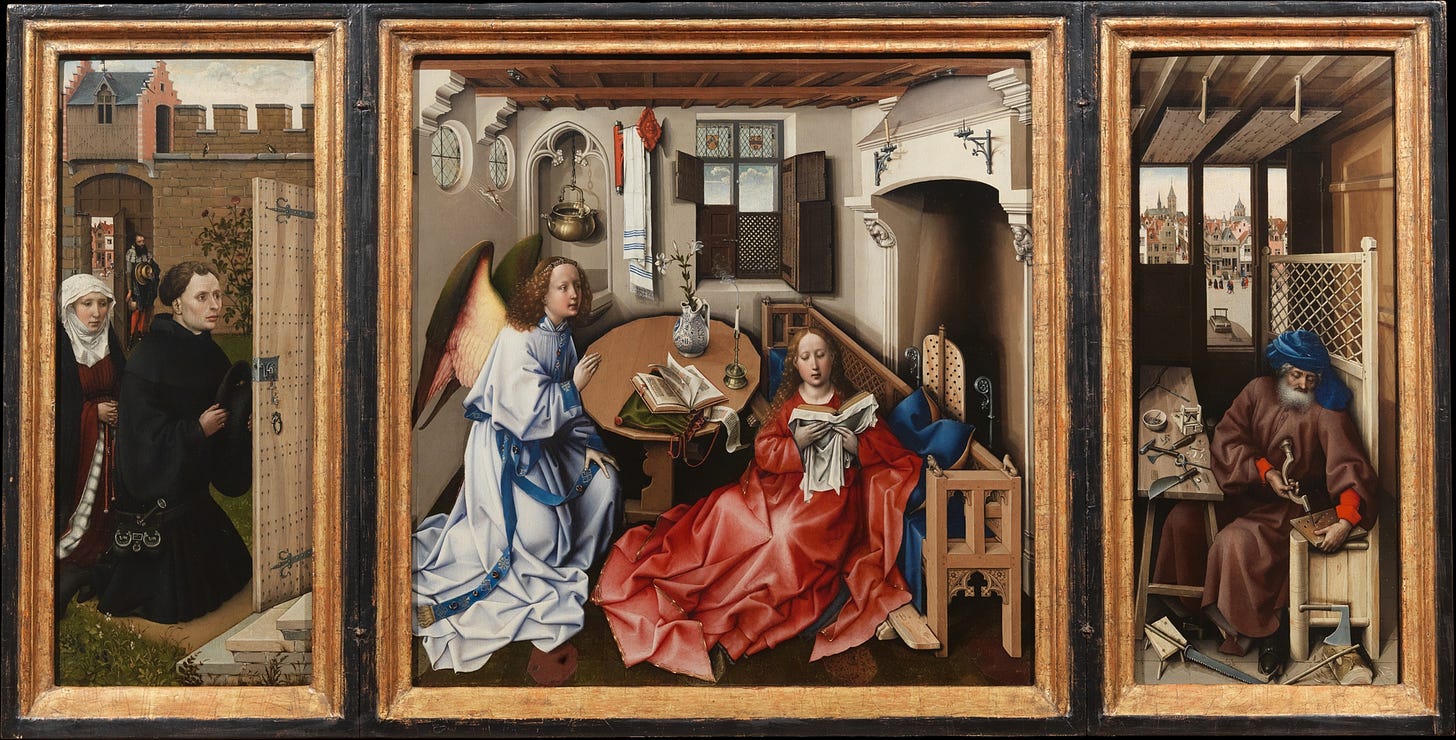Jesus to me is honey in the mouth, music in the ear, a song in the heart.
Advent Day 17: Bernard of Clairvaux (1090-1153)
Christian mystics have reported visions throughout the ages. Julian of Norwich had her Jesus with a hazelnut in the palm of his hand. Teresa of Avila saw an angel holding a spear of gold. Hildegard of Bingen had the bright vault of heaven opened to her. But perhaps the most startling vision belongs to Bernard of Clairvaux.
One day Bernard, who was seriously ill, was deep in prayer when he had a vision of Mary breastfeeding the baby Jesus. Once Jesus was full, Mary shifted the baby to her left arm and let fly a stream of milk straight into Bernard’s mouth. (This incident inspired a sub-genre of painting called The Lactation of St. Bernard. Google it. My favorite, by Alonso Cano, shows Mary having impressive aim). Miraculously healed after this vision, Bernard went on to become one of the greatest mystics in history—one remembered for his deep intimacy with God which he described, perhaps not surprisingly, in sensual, earthy terms.
Bernard was born in 1090 to a noble French family. Highly charismatic, he never lacked for friends who eagerly tagged along on his frequent nights out on the town during which he sampled the temptations and delights available to the aristocracy. But when his mother died in 1113, grief-stricken Bernard vowed to abandon his carousing ways and devote his life to prayer and contemplation at the nearby Benedictine abbey. His friends followed him even there. When he arrived at the abbey doors it was with more than two dozen buddies in tow.
Bernard’s sharp intellect and spiritual genius soon revealed themselves. Only two years after entering the abbey, his superiors sent him and twelve others to found a new monastery in Clairvaux.
Bernard would go on to found scores of monasteries, dabble in papal politics, and promote contemplative practices like Lectio Divina and meditation. He also produced a wealth of writing where he explored his experience of God as pure love.
Like many medieval mystics, he used marital language to describe his connection to God.
The Bridegroom’s love, or rather the love which is the Bridegroom, asks in return nothing but faithful love. Let the beloved, then, love in return. Should not a bride love, and above all, Love’s bridegroom? Could it be that Love not be loved?
Bernard’s insight wasn’t just that God loves us, but that God is Love. This phrase is familiar in the twenty-first century (though even today, arguably, little considered or contemplated), but to twelfth-century people reared on fire and brimstone religion it was a revelation.
Bernard spent his life preaching the mystical marriage, and counseling others how, through loving action and contemplation, they might increase their intimacy with God. He did this most significantly in eighty-six sermons on the Old Testament erotic allegory Song of Songs.
In Sermon Three, he describes the journey toward the Divine as a series of increasingly intimate kisses.
First, the kiss of contrition where we grow weary with our old ways of doing things and, longing for a deeper life, we fall at Christ’s feet and cover them with kisses and tears.
Second, the kiss of grace as we commit to follow the forgiving, loving and peaceful path of Jesus. This commitment is offered as a kiss on Christ’s hand.
Finally, the kiss of union when we have walked the spiritual journey a while and are making real, lasting change, and living with honest humility.
…then shall we humbly dare to raise our eyes to his mouth, so divinely beautiful, not merely to gaze upon it, but I say it with fear and trembling — to receive its kiss. Christ the Lord is a Spirit before our face, and he who is joined to him in a holy kiss becomes through his good pleasure one spirit with him.
Bernard goes on to say that once you’ve tasted this intimacy with Christ, your heart hungers for more, and you live your life pursuing it.
If Bernard’s words sound strange to modern ears, recall that in his day people were still intimate with all aspects of bodily life—not just their own bodies but those of others. We birthed children at home, our loved ones died at home, and we butchered our own animals. We also lived in one-room dwellings. No part of life was hidden from view. And if the idea of Mary squirting milk into Bernard’s mouth seems a little shocking, remember that prior to the invention of infant formula, breastfeeding was the one and only source of life for babies. Through breastfeeding, love became life. As such, it rose to the level of the mystical and spiritual. Even the Bible conjures images of breastfeeding:
Rejoice with Jerusalem…all you who love her…that you may suck and be satisfied with her consoling breasts; that you may drink deeply with delight from the abundance of her glory. Isaiah 66:10-12
Bernard dove deeper into his favorite theme in his masterpiece On The Love Of God, where he describes four degrees of ascending love:
Love of self for self’s sake wherein we love ourselves and primarily serve our own needs by constantly seeking security and pleasure (Bernard knew something about this from his youth).
Love of God for self’s sake wherein we love God out of fear that, if we don’t, He will shut down some (imagined) divine ATM and stop providing for us.
Love of God for God’s sake. This is where the path grows narrow and many turn back. It is the point in our lives when we realize that God has not saved us from our trials but has sustained us through them. With the passage of each trial, our hearts soften, and we are more and more called to lovingkindness and generosity, not in hopes of reward, but because this is how Jesus loves us, and as followers of Jesus we are called to mirror him.
Love of self for God’s sake. Here, the state of graced union with God is achieved. Having reached this stage, any gift or praise we receive we see as belonging to God rather than to us.
Bernard warns that the 4th degree is only reached through contemplative practice, and even then comes only in flashes.
Such experiences are rare and come only for a moment. In a manner of speaking, we lose ourselves as though we did not exist, utterly unconscious of ourselves and emptied of ourselves…This perfect love of God with our heart, soul, mind, and strength will not happen until we are no longer compelled to think about ourselves…Only then can the soul attend to God completely. This is why in the present body we inhabit this is difficult to maintain. But it is within God’s power to give such an experience to whom he wills, and it is not attained by our own efforts.


Ultimately, one cannot talk about Bernard without noting his many spiritual friendships, for it was in friendship, allyship and mentoring that he sought the God who is Love. Throughout his life he cultivated deep relationships with fellow contemplatives and reform-minded priests and nuns, including Aelred of Rievaulx. But perhaps most significant was his relationship with German mystic Hildegard of Bingen.
Today, Hildegard is considered one of history’s great minds, a pioneer in the fields of medicine, music, natural science and religion. But when she and Bernard first met, she was a middle-aged woman who’d spent nearly all her life cloistered in a convent. Nearing fifty, she was bursting at the seams, wanting to gift to the world the vast, inclusive spirituality that was inside her.
The problem she faced was multi-faceted. A) She was a woman in a time when the only women with a voice were royalty. B) She was a nun under orders of obedience to a rigid church hierarchy. C) She thought she might be crazy.
The last of these prompted her to contact Bernard. In a series of letters, Hildegard shared the mystical visions she’d experienced since childhood, and the spirituality she’d developed around them. What she wanted from Bernard was an opinion: Were these from God? Or were they a figment of her imagination? And if they were of God, should she share them or shut up?
Bernard’s reply was fully affirming:
When the learning and the anointing (which reveals all things to you) are within, what advice could (I) possibly give?
In other words, Trust yourself, Hildegard.
Bernard’s reply gave Hildegard the nudge she needed to go public. It also initiated a robust, years-long friendship in which each challenged the other to imagine what the God of Love looked like in the world. Perhaps the greatest fruit of this was when Bernard, at Hildegard’s urging, spoke out against the violence being committed in the Crusades, a religious conquest he had once championed.
Ultimately, Bernard’s life was a constant journey toward God—a God who was not the wrathful Father most of his time believed in (and too many still today), but one who loves and wants love and who is Love. A God who enlivens all our senses. Once awakened to this God in his youth, Bernard spent his life trying to share the good news. In the Christ-soaked world in which Bernard lived, the sole purpose of all creation was to love. Love was the Alpha and the Omega, its own reason and reward, leading him to proclaim,
Love seeks no cause beyond itself and no fruit; it is its own fruit, its own enjoyment. I love because I love you; I love in order that I may love.
Practice
Many of you will be familiar with one of Bernard’s favorite contemplative practices, Lectio Divina. Lesser known is a practice called Visio Divina. Visio follows the same basic pattern as Lectio, but using art to foster a practice of sacred seeing.
For today’s practice, try a Visio Divina session using this 15th century Dutch painting of the Annunciation. I recommend looking at this on a larger screen. You can also view it here:
Then follow these directions offered by New Camaldoli Hermitage:
Start in silence with your eyes closed, remain still, and remember that you are in God’s loving presence.
Gaze at the image. Let your eyes explore the image, then rest on the characters and objects without rushing. Note your feelings without judgment as you examine the whole and parts of the work.
If you’d like, you can read accounts of the events over which you pray.
Gaze at the work again and imagine that you are in this scene. Who are you in the scene? Where are you, and what do you see from there? What do you hear or say?
How is the sacred present to you in this experience? What is God saying, and how do you respond?
In silence and stillness, take a few moments to contemplate God’s gift in your prayer. Rejoice in His love.
Holiday Happenings at Life In The City
All in-person gatherings are at 205 East Monroe Street in Austin, Texas.
Sun. Dec. 8, 11:15am: LITC's original holiday musical, Make Room In Your Heart. Sat. Dec. 21, 6:00pm: Blue Christmas, an intimate gathering for the longest night. Mon. Dec. 23, 6:00pm: Christmas Eve-Eve candlelight service...an LITC tradition! Sun. Dec. 29, 11:15am: Welcome 2025 with a casual service of coffee, cookies, conversation and resolution-making.
Contemplation In The City
Life In The City’s contemplative community meets regularly to practice sacred traditions like Lectio Divina and Centering Prayer. If you’re in Austin, consider joining us. Upcoming in-person gatherings are Jan. 14, Feb. 4, Mar. 4, Apr. 8, May 6. We meet at 205 East Monroe Street in Austin. Doors open at 6pm for coffee and conversation, service from 7-8pm. You might also find meaning in our monthly newsletter in which we wrestle with how to live a spiritually engaged life in the modern world. Read more here.
Ready For More?
Read the Introduction to the 2022 edition, to find out how my experience of September 11, 2001 became my gateway to Advent.
Find more mystics, saints and prophets in our Archive.
Feedback
Catch a typo? Have suggestions for mystics, saints and prophets for a future year? Leave feedback in the Comments below or email Greg Durham at greg@litcaustin.org.








Bernard's story is another good one. Admittedly, his connection to God described in sensual terms wasn't the most natural concept for me to absorb mainly because some religions (or maybe more so people) teach that human bodies = bad/shameful. His insights are still a revelation in 2024.
I also find his vision of Mary so interesting. It reminds me of the conclusion of John Steinbeck's "The Grapes of Wrath," in which Rose of Sharon breastfeeds a dying man in a barn to save him from starvation. It mirrors Bernard’s story: He was seriously ill and after his vision of being breastfed by Mary, he is miraculously healed. When I first read "Grapes" as a teenager, I remember being perplexed at this ending. But after reading this Advent entry and the context of Isaiah 66:10-12, it brings to mind the themes of "salvation" and "new beginnings" for the starving man--which also applied to Bernard post-vision.